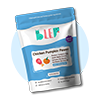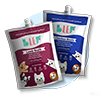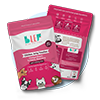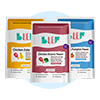A lot of us have grown up with the idea that dogs can eat whatever we humans eat, but that’s not entirely accurate. There are a number of human food ingredients that are toxic to dogs - onions, garlic, grapes, raisins, chocolate, etc. However, just like humans, dogs also need a balanced diet for a healthy and long life. So, what does this balanced dog diet look like?
The Association of American Feed Control Officials (AAFCO) is an independent, nonprofit body that works to ensure that animal food has gone through the appropriate amount of analyses and checks and contains the right amount of nutrients that are required by different animals. According to them, dogs need six essential nutrients to function optimally - protein, carbohydrates and fibre, vitamins, minerals, fat, and water. Each nutrient supports life in a different way. Let us find out what functions these perform in a dog’s body.
What Are the Components of a Balanced Dog Diet?
Protein
Protein builds the foundation of the body. It helps create and maintain muscle, skin, hair, nails, cartilage, tendons, and ligaments. Protein also helps with the body’s ability to produce antibodies, energy, blood, and hormones. The breakdown of protein makes amino acids, 10 of which are essential for dogs. These essential amino acids must come from a balanced dog diet, as they cannot be produced by dogs.
Dogs need much more protein than we realise the minimum protein requirement for them per day is 2.2 times their body weight. Animal protein has a higher amount of essential amino acids, coming from sources like chicken, fish, lamb, etc. Plant-based protein from sources like paneer, lentils, green peas, chickpeas, etc., are also good for dogs. However, if your pup is on a plant-based diet, make sure to consult your vet first to ensure that they’re getting all the essential amino acids that they need.
Fat
Excess fat in the body can cause serious harm in dogs, just like in humans. But fats are also essential to the functioning of the body because they provide energy, help absorb fat-soluble vitamins, and provide essential fatty acids, which support brain development and immunity. A deficiency in fats may cause a number of issues, such as a dull and patchy coat, stiff joints, decreased wound healing, increased inflammation, etc.
Considering fat is the most concentrated energy source in dogs, the amount of fat that is needed by dogs every day in a balanced dog diet varies depending on age, weight, activity levels, life stages, etc. However, it is usually recommended that a minimum of 5.5% of an adult dog’s diet should come from fats. Fats can come from both animal and plant sources. Some sources of essential fatty acids like Omega-3 and Omega-6 are vegetable oils, chicken, flaxseeds, fatty fish, etc.

Water
Water is widely considered the most important nutrient in a balanced dog diet because of the versatile functions that it performs in the body, it regulates temperature, forms the bodily fluids, keeps joints functioning, helps in digestion and nutrient breakdown, maintains eye shape, protects the nervous system and generally gives structure to the body.
Dogs either simply drink water or get their water via moist food. They need about 60-80ml of water per kg of body weight. They should be given fresh and clean water, since stagnant water may have harmful microbes. An unusual increase or decrease in water intake should be reported to your vet.
Carbohydrates and Fibre
Carbohydrates, especially fibre, are needed in a balanced dog diet because carbs provide the bulk of the energy. It is also a major source of dietary fibre, which is needed for good bowel movement and to maintain good bacteria in the gut. Carbohydrates break down into glucose, which the body needs. If the body doesn’t get enough glucose, it starts breaking down protein, which is bad for the body because it needs protein for different purposes.
Depending on the weight, age, breed, life stage, and level of activity of a dog, the energy requirement varies in dogs. Puppies, pregnant dogs, and lactating dogs need more energy, and therefore the carb content in their food has to be higher. On the other hand, senior dogs need fewer calories overall, but for them the type of carbohydrate is crucial, as high-glycaemic carbs may increase inflammation. It is important to note here that there is no specific amount of carbs that are required by dogs, and too much can result in obesity.
Vitamins
Vitamins form an integral part of a balanced dog diet because they perform a myriad of functions, such as DNA creation, effective blood clotting, fighting infections, maintaining vision, bone development, healthy neurological function, and others. However, vitamins can be just as bad as they are good for a dog, because an excess can cause toxicity in the body, and a deficiency can also cause serious complications.
The vitamins that a dog needs may be sorted into two categories - water-soluble and fat-soluble. Among the water-soluble vitamins, the main ones needed by dogs are B1, B2, B3, B5, B6, B9, B12, B7 and H, and Choline. These are absorbed by the body easily and are not stored, so they are prone to deficiencies. The four essential fat-soluble vitamins for dogs are A, D, E, and K. Because these get stored in the body, if not used up, the excess may become toxic.
Minerals
Minerals are essential for a body, because they help form the structure of the body and assist in a number of functions as well. Some minerals are needed more, as they are parts of the bones, teeth, nails, cells, muscles, nerves, etc., such as Calcium, Phosphorus, Magnesium, Potassium, Sodium, and Chloride. These are the macro-minerals. Others are needed in lesser amounts but are important for metabolic processes, such as Iron, Copper, Zinc, Manganese, Selenium, and Iodine. These are the trace or micro-minerals. No matter how small a quantity is needed, minerals are a big part of a balanced dog diet.

Is a Balanced Dog Diet Enough to Keep Your Dog Healthy?
Physical Activity
While diet is important, physical activity is also an important factor in keeping dogs healthy. Usually, sedentary dogs are at a higher risk of diseases and associated problems. Lifestyle diseases like obesity are directly linked to reduced physical activity. Therefore, fulfilling your dog’s physical activity needs is as important as giving them a healthy, nutritionally balanced meal.
The amount of exercise needed by dogs varies from 30 minutes to 2 hours or more, depending on factors like age, health, and breed. Some high-energy breeds, such as Border Collies, Huskies, German Shepherds, Labradors, require at least 1.5 to 2 hours of exercise per day. Medium-energy breeds like Bulldogs, Cocker Spaniels, and Beagles need about 45 minutes to 1 hour of physical activity every day, even if they’re small in size and tire easily. Low-energy breeds, such as Pugs, Shih Tzus, Basset Hounds need around 30 minutes of short walks and gentle play.
Puppies need a balance of exercise and rest, so 10-15 minutes of intense play several times a day is better for them. Adult dogs need a routine physical exercise time. You need to be gentle with the physical exercise of senior dogs, as they may suffer from low energy or bone and joint issues. They must not strain their joints.
Mental Stimulation
Just like physical exercise, dogs also need good mental stimulation, especially in the form of puzzles, memory games, scent work, command recall, etc. If it is accompanied by food, such as in puzzle feeders or treat dispensers, then it is even more effective. Around 15-20 minutes of daily mental stimulation is required by dogs, although some breeds may need more than others, such as Border Collies, German Shepherds, Retrievers, Jack Russell Terriers, Australian Cattle Dogs, etc.
Without mental stimulation, dogs may get bored, anxious, or destructive. Some signs that they may be lacking mental stimulation are chewing furniture, digging, restlessness, overexcitement, excessive licking, fighting with other pets, etc.
Vaccination
Another important aspect of keeping your dog healthy is to be up-to-date on their vaccinations and deworming schedule. Some of the most essential vaccines are for Rabies, Canine Distemper, Canine Parvovirus, Canine Hepatitis, Leptospirosis. These usually start around 6-8 weeks of age and continue annually after they turn 1.
Similarly, deworming is also essential for good health and proper growth of dogs. The first session is usually around 2 weeks of age. Then, deworming must be done every two weeks till the pup is 12 weeks old. Once they turn 3 months old, the cycle becomes once a month, and pups older than 6 months must be dewormed every 3 to 6 months for the rest of their lives.
Socialisation
Just like mental stimulation is important for a dog’s overall mental health, socialisation is also a significant part of a dog’s development. Through socialisation, dogs learn to make sense of the world around them and figure out how to exist in it. Socialisation implies teaching a dog how to behave around new and unfamiliar places, things, and people. Regulating their interactions with other living beings, especially their pet parents, children, senior citizens, strangers, other dogs and animals, etc., is crucial.
Socialisation is done to strengthen confidence, reduce anxiety and fear, and encourage good behaviour. The objective, ultimately, is to promote happiness and positive feelings in dogs, and to help them settle into a human-populated life. Since mental health is directly related to a lot of biological functions, such as digestion, hormone regulation, reproduction, etc., it is just as important a factor for dogs’ well-being.

To us at BLEP, providing your pups with a balanced diet is at the core of our mission, and all our products are a reflection of that. From our natural food to our broths and treats, each product has been thoughtfully formulated to support your pup’s overall well-being and help them stay by your side for as long as possible.
Looking to explore more healthy treats and care tips for your furry friend? Check out our other guides like Can Dogs Eat Apples?, Can Dogs Eat Blueberries?, Dog Food for Weight Loss, Raw v/s cooked meat for dogs, Home Remedies to cure tick fever, Finding Good Dog Food in India, How many times should I feed my dog?, Things you should do to keep your pet healthy, Types of Dog Food, and >How Prebiotics and Probiotics can improve your dog's digestion. Each guide is designed to help you make better food choices for your dog because the right diet is what gives you a happy and thriving pup.
Resources:
https://www.petmd.com/dog/nutrition/evr_dg_whats_in_a_balanced_dog_food
https://www.dogseechew.in/blog/how-much-exercise-does-your-dog-need
https://www.akc.org/expert-advice/health/how-much-exercise-does-dog-need/
https://petwarehouse.shop/blogs/pet-warehouse/alternate-protein-for-vegetarian-dogs
https://wagwalking.com/wellness/what-percentage-of-a-dogs-diet-should-be-fat












